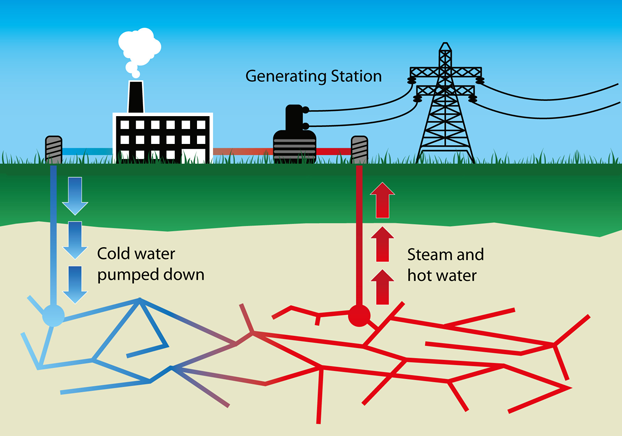
Geothermal Energy Advantages And Disadvantages
Geothermal energy is a type of renewable energy that harnesses the natural heat from the Earth’s core. It is a clean and sustainable energy source that offers several advantages over traditional fossil fuels. However, like any energy source, geothermal energy has its own set of disadvantages. In this article, we will explore the advantages and disadvantages of geothermal energy in detail.
Geothermal Energy Advantages And Disadvantages
What is Geothermal Energy?
Geothermal energy is the heat that is generated from the Earth’s core. It is a renewable energy source because it is constantly replenished by the heat generated from the decay of radioactive isotopes in the Earth’s core. This heat is transferred to the Earth’s surface through convection, conduction, and radiation.
Geothermal energy is used to generate electricity and heat buildings. There are three types of geothermal power plants: dry steam, flash steam, and binary cycle power plants. The type of power plant used depends on the temperature of the geothermal resource.
How Does Geothermal Energy Work?
Geothermal energy works by tapping into the Earth’s heat. Geothermal power plants use the heat from the Earth’s core to generate electricity. The heat is transferred to a fluid, which is then used to turn a turbine, which generates electricity. The hot water or steam from the geothermal reservoir is used to turn the turbine, and the cooled water or steam is then injected back into the ground.
Geothermal heat pumps, on the other hand, use the Earth’s heat to heat and cool buildings. A geothermal heat pump uses the constant temperature of the Earth as a source of heat in the winter and as a source of cooling in the summer. This technology is highly efficient and can save homeowners up to 70% on their heating and cooling bills.
Advantages of Geothermal Energy
Geothermal energy is a type of renewable energy that is generated from the earth’s natural heat. It is a clean and sustainable source of energy that has a number of advantages over other forms of energy. In this article, we will explore the various advantages of geothermal energy.
1. Renewable and Sustainable:
Geothermal energy is a renewable and sustainable source of energy as it is derived from the earth’s natural heat. The heat from the earth’s core is constantly being replenished and is inexhaustible. Unlike fossil fuels, geothermal energy does not produce harmful emissions and does not contribute to climate change.
2. Reliable and Predictable:
Geothermal energy is a reliable and predictable source of energy as it is not dependent on weather conditions. Unlike wind and solar power, geothermal power plants can operate 24/7, providing a constant and consistent source of energy.
3. Low Operating Costs:
Geothermal power plants have low operating costs as they require little maintenance and have a long lifespan. Once a geothermal power plant is built, the only ongoing cost is the cost of drilling new wells and maintaining the plant.
4. High Efficiency:
Geothermal power plants have a high efficiency rate as they convert a high percentage of the heat from the earth’s core into electricity. In fact, geothermal power plants have the highest capacity factor of any renewable energy source, with an average capacity factor of 73%.
5. Small Footprint ( Geothermal Energy Advantages And Disadvantages ) :
Geothermal power plants have a small footprint and do not require large tracts of land. Unlike solar and wind power plants, geothermal power plants can be built underground, minimizing their impact on the environment.
6. Versatile ( Geothermal Energy Advantages And Disadvantages ):
Geothermal energy can be used for a variety of applications including heating and cooling buildings, generating electricity, and industrial processes. This versatility makes it a valuable resource for a range of industries.
7. Economic Benefits ( Geothermal Energy Advantages And Disadvantages ) :
Geothermal energy can provide economic benefits to local communities. Geothermal power plants can create jobs and stimulate economic growth in the surrounding areas. In addition, geothermal energy can provide a stable source of income for landowners who lease their land for geothermal development.
8. Reduced Dependence on Fossil Fuels ( Geothermal Energy Advantages And Disadvantages ) :
Geothermal energy can reduce our dependence on fossil fuels and help us transition to a more sustainable energy future. By utilizing the earth’s natural heat, we can reduce our reliance on non-renewable sources of energy and decrease our carbon footprint.
Conclusion on Advantages of Geothermal Energy ( Geothermal Energy Advantages And Disadvantages ) :
In conclusion, geothermal energy has numerous advantages over other forms of energy. It is a renewable, reliable, and sustainable source of energy that has low operating costs and a high efficiency rate. Geothermal energy is also versatile, has a small footprint, and provides economic benefits to local communities. By utilizing geothermal energy, we can reduce our dependence on fossil fuels and transition to a more sustainable energy future.
Disadvantages of Geothermal Energy
Geothermal energy is a form of renewable energy that has been used for thousands of years for heating, bathing, and other purposes. However, despite its many benefits, geothermal energy also has its disadvantages. In this article, we will explore some of the drawbacks of geothermal energy.
1. High Initial Costs ( ( Geothermal Energy Advantages And Disadvantages )
One of the main disadvantages of geothermal energy is the high initial costs involved in building a geothermal power plant. The process of drilling geothermal wells and constructing power plants can be very expensive, especially in areas with difficult terrain or where the geothermal resource is located at great depths. This high cost can make it difficult for some communities or countries to invest in geothermal energy.
2. Resource Limitations ( Geothermal Energy Advantages And Disadvantages )
Another disadvantage of geothermal energy is that it is not available everywhere. Geothermal resources are limited to areas with high heat flow, such as near tectonic plate boundaries or volcanic regions. This means that not all countries or regions have access to geothermal energy, which can limit its potential as a renewable energy source.
3. Environmental Concerns ( Geothermal Energy Advantages And Disadvantages )
While geothermal energy is a renewable energy source, it still has some environmental concerns. For example, the process of drilling geothermal wells and constructing power plants can cause disturbances to the local environment, such as land subsidence or earthquakes. In addition, geothermal power plants can release small amounts of greenhouse gases and other pollutants into the atmosphere.
4. Maintenance and Repairs ( Geothermal Energy Advantages And Disadvantages )
Geothermal power plants require regular maintenance and repairs to ensure their continued operation. The geothermal wells can become clogged with minerals or other debris, which can reduce the efficiency of the power plant. In addition, the power plant’s mechanical components can wear out over time, which can lead to costly repairs.
5. Geopolitical Risks ( Geothermal Energy Advantages And Disadvantages )
Finally, geothermal energy is subject to geopolitical risks. Some countries or regions may have political instability or conflicts that could disrupt the supply of geothermal energy. In addition, the cost of importing geothermal equipment or expertise can be affected by changes in international trade or currency exchange rates.
Conclusion on Disadvantages of Geothermal Energy
Despite these disadvantages, geothermal energy remains an important source of renewable energy. Its ability to provide a constant and reliable source of energy makes it an attractive option for many countries and communities. As technology improves and the costs of building geothermal power plants decrease, geothermal energy is likely to become an even more important part of the world’s energy mix.
Conclusion :
In this article, we have explored the advantages and disadvantages of geothermal energy in detail. While there are some challenges associated with geothermal energy, the benefits are clear, including its sustainability, reliability, and low environmental impact. With continued investment and innovation, geothermal energy has the potential to play a significant role in the world’s energy mix in the future.
Some Frequently Asked Questions (FAQs) on the Topic of Geothermal Energy Advantages and Disadvantages
1. What is geothermal energy?
Geothermal energy is a type of renewable energy that is generated by harnessing the heat energy produced by the Earth’s core. This heat can be used to produce electricity or to heat buildings and homes.
2. What are the advantages of geothermal energy?
Geothermal energy is a clean and renewable source of energy, which means that it does not produce harmful greenhouse gas emissions like fossil fuels. It is also a reliable source of energy that can be generated 24/7, and it can be used for both electricity generation and heating.
3. What are the disadvantages of geothermal energy?
One potential disadvantage of geothermal energy is that it is not widely available in all areas. It is primarily found in areas with high geothermal activity, such as near tectonic plate boundaries. Additionally, the cost of building and maintaining geothermal power plants can be relatively high compared to other renewable energy sources.
4. Is geothermal energy expensive?
The cost of generating geothermal energy can vary depending on the location and size of the geothermal power plant, as well as other factors such as the cost of drilling and maintaining the wells. However, geothermal energy can be a cost-effective source of energy in areas with high geothermal activity, where it can be harnessed relatively easily.
5. How does geothermal energy compare to other renewable energy sources?
Geothermal energy has some advantages over other renewable energy sources, such as solar and wind power, because it can generate electricity or heat continuously, regardless of weather conditions. However, it is not as widely available as solar or wind energy, and it can be more expensive to develop and maintain geothermal power plants.
6. What is the future of geothermal energy?
Many experts believe that geothermal energy has significant potential as a renewable energy source, particularly in areas with high geothermal activity. Advancements in geothermal technology could help make it more cost-effective and accessible in the future, which could lead to increased use of geothermal energy worldwide.
- Unleash the Harvest: Fast-Growing Vegetables for California’s Raised Garden Beds
 Fast-Growing Vegetables for California’s Raised Garden Beds : California’s golden sunshine, mild climate, and fertile soil are a gardener’s dream. Elevated planting in raised garden beds takes this advantage to the next level. These controlled environments offer improved drainage, easier pest management, and the perfect canvas for cultivating a fast and furious vegetable bounty. Fast-Growing… Read more: Unleash the Harvest: Fast-Growing Vegetables for California’s Raised Garden Beds
Fast-Growing Vegetables for California’s Raised Garden Beds : California’s golden sunshine, mild climate, and fertile soil are a gardener’s dream. Elevated planting in raised garden beds takes this advantage to the next level. These controlled environments offer improved drainage, easier pest management, and the perfect canvas for cultivating a fast and furious vegetable bounty. Fast-Growing… Read more: Unleash the Harvest: Fast-Growing Vegetables for California’s Raised Garden Beds - Pitbull Announces Party After Dark Tour With T-Pain: A Must-See Event for Music Lovers
 Pitbull Announces Party After Dark Tour With T-Pain : Pitbull, the renowned artist known for his electrifying performances and chart-topping hits, has recently announced the much-anticipated “Party After Dark Tour” featuring none other than the iconic T-Pain as a special guest. This tour promises to be a spectacular celebration of music, bringing together two powerhouse… Read more: Pitbull Announces Party After Dark Tour With T-Pain: A Must-See Event for Music Lovers
Pitbull Announces Party After Dark Tour With T-Pain : Pitbull, the renowned artist known for his electrifying performances and chart-topping hits, has recently announced the much-anticipated “Party After Dark Tour” featuring none other than the iconic T-Pain as a special guest. This tour promises to be a spectacular celebration of music, bringing together two powerhouse… Read more: Pitbull Announces Party After Dark Tour With T-Pain: A Must-See Event for Music Lovers - Unwind with Your Furry Friend: Pet-Friendly Cabins with Private Hot Tubs near Yellowstone National Park
 Pet-Friendly Cabins with Private Hot Tubs near Yellowstone National Park : Yellowstone National Park, a crown jewel of the American wilderness, beckons adventurers with its geysers, hot springs, and breathtaking landscapes. But what if you could experience this wonder alongside your furry best friend? Imagine returning from a day of exploring the park’s marvels, sharing… Read more: Unwind with Your Furry Friend: Pet-Friendly Cabins with Private Hot Tubs near Yellowstone National Park
Pet-Friendly Cabins with Private Hot Tubs near Yellowstone National Park : Yellowstone National Park, a crown jewel of the American wilderness, beckons adventurers with its geysers, hot springs, and breathtaking landscapes. But what if you could experience this wonder alongside your furry best friend? Imagine returning from a day of exploring the park’s marvels, sharing… Read more: Unwind with Your Furry Friend: Pet-Friendly Cabins with Private Hot Tubs near Yellowstone National Park - Cultivate Your Dreams: Building a Raised Garden Bed in Tight Spaces
 Building a Raised Garden Bed in Tight Spaces : For city dwellers and space-conscious gardeners, the dream of fresh, homegrown produce might seem like a distant utopia. But fret no more! Raised garden beds offer a game-changing solution, transforming even the most limited balconies, patios, or sunny nooks into flourishing mini-farms. Building a Raised Garden… Read more: Cultivate Your Dreams: Building a Raised Garden Bed in Tight Spaces
Building a Raised Garden Bed in Tight Spaces : For city dwellers and space-conscious gardeners, the dream of fresh, homegrown produce might seem like a distant utopia. But fret no more! Raised garden beds offer a game-changing solution, transforming even the most limited balconies, patios, or sunny nooks into flourishing mini-farms. Building a Raised Garden… Read more: Cultivate Your Dreams: Building a Raised Garden Bed in Tight Spaces - Best Organic Mattresses for Back Pain Sufferers Under $1,500
 Best Organic Mattresses for Back Pain Sufferers Under $1,500 : Waking up with a crick in your neck or lower back pain can put a damper on anyone’s day. But for chronic back pain sufferers, a good night’s sleep can feel like a distant dream. The right mattress can make a world of difference, providing… Read more: Best Organic Mattresses for Back Pain Sufferers Under $1,500
Best Organic Mattresses for Back Pain Sufferers Under $1,500 : Waking up with a crick in your neck or lower back pain can put a damper on anyone’s day. But for chronic back pain sufferers, a good night’s sleep can feel like a distant dream. The right mattress can make a world of difference, providing… Read more: Best Organic Mattresses for Back Pain Sufferers Under $1,500



